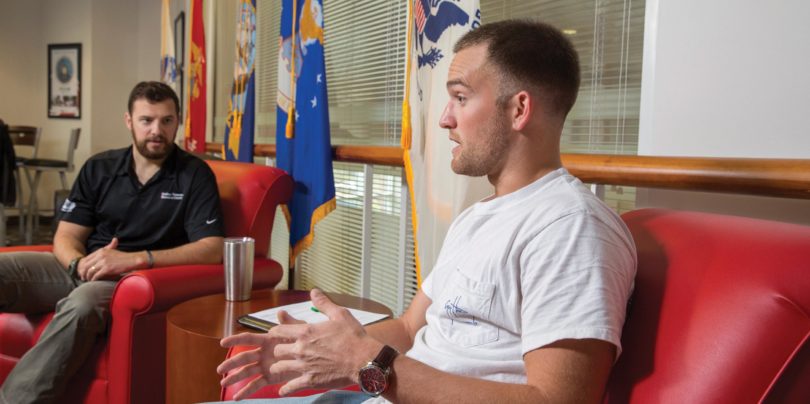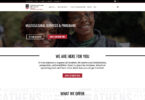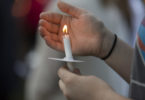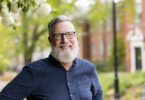Mandy Enloe’s dream was simple. The Woodstock native wanted to fly planes, just like her dad.
 After serving in the Air Force, Mandy Enloe returned to Georgia to enroll at UGA.
After serving in the Air Force, Mandy Enloe returned to Georgia to enroll at UGA.
At top, Dan Phillips, left, and Coast Guard veteran John Davis meet at the First Data Student Veterans Lounge in Tate Student Center. (Peter Frey/UGA)
Aspiring to be a pilot, she joined the U.S. Air Force in 2010 and was assigned to work on U2 aircraft as a mechanic at Beale Air Force Base in California. It was gritty, demanding work; she was usually the only woman in a unit of 800, and she loved it.
“I’m not your typical ‘girly’ girl,” Enloe says. “I liked working on planes and getting dirty.”
But when it was time to decide whether to re-enlist or move on to a new career, she started to rethink her plans. Her initial goal was to become an Air Force pilot, but her interests changed along the way.
Instead, she’ll follow her passion for fitness, something she discovered when she joined the service. She wants to become a personal trainer for the Department of Defense working with the special forces operations.
 Enloe, who found a passion for fitness in the military, works at UGA’s Ramsey Student Center and is studying to become a personal trainer. (Peter Frey/UGA)
Enloe, who found a passion for fitness in the military, works at UGA’s Ramsey Student Center and is studying to become a personal trainer. (Peter Frey/UGA)
She’s still determined to fly — but she’ll do that as a civilian, working toward her fixed-wing license.
Once Enloe made up her mind, she looked back to her home state to get a college degree.
“I’m from Georgia and I was born a Dawg,” she says. “I want UGA on my diploma, and (the College of Education) has an excellent exercise science program.”
In 2016, Enloe came to UGA, becoming one of about 250 student veterans enrolled at the university.
In recent years, the university has strengthened its commitment to supporting student veterans, who can face unique challenges. Launched by the university’s Division of Student Affairs in 2013, the Student Veterans Resource Center, or SVRC, aims to ease veterans’ transitions onto campus, enable access to services, and help them make the most of their UGA education. It’s also become a way for student veterans to connect with each other.
That commitment has paid off. The graduation rate among UGA’s student veterans is 85 percent — on par with UGA’s nonveteran students and well above the national average of about 50 percent. In 2016, UGA was named the top institution in the nation for student veterans among tier-one research institutions by Victory Media.
American men and women join the Armed Forces for a variety of reasons, including a sense of duty. Another top reason is the education benefits provided by the post-9/11 GI Bill, according to a survey from the Syracuse University Institute for Veterans and Military Families.
Nationwide over 450,000 student veterans have earned their degrees using the 9/11 benefit since 2009. However, student veterans pursuing a bachelor’s degree may take up to two years longer than their nonveteran peers, according to the Department of Veterans Affairs.
 SVRC Director Ted Barco, center, worked with Dan Phillips, left, and Ryan Mohney to create a career readiness program for UGA veterans. (Peter Frey/UGA)
SVRC Director Ted Barco, center, worked with Dan Phillips, left, and Ryan Mohney to create a career readiness program for UGA veterans. (Peter Frey/UGA)
“A challenge for student veterans is that as older nontraditional students they are often pulled in multiple directions at the exact same time with school, family, work and health issues,” says Ted Barco, director of UGA’s SVRC. “Left unaddressed, this has the potential to become a knot of tangled issues — often further tightened through veterans’ sense of self-reliance, which at times may work against their long-term interests.”
To deal with these issues the SVRC builds responsive networks (such as mentoring programs) with students, faculty, staff, administrators, alumni and community partners.
Another challenge is the transition. Most UGA undergraduate veterans are transfer students coming from schools and colleges across Georgia. Many of them, like Air Force veteran Kyle McReynolds, find the switch to a large and rigorous university like UGA difficult.
“I was a prime example of what we call transfer shock,” says McReynolds.
 Air Force veteran Kyle McReynolds relied on support from the SVRC to transition to becoming a full-time UGA student. (Peter Frey/UGA)
Air Force veteran Kyle McReynolds relied on support from the SVRC to transition to becoming a full-time UGA student. (Peter Frey/UGA)
In 2014, McReynolds switched from active duty to the Air Force Reserve and transferred from a community college to UGA to work on a business management degree.
The large campus was intimidating, and his classmates were younger and seemed better prepared for the rigors of college, plus McReynolds signed up for a course load that he realized he wasn’t ready to handle.
He came to the SVRC for help and found a mentor in Barco, who directed him toward the kinds of financial and academic resources he needed to survive his first semester and acclimate to campus.
Barco, a retired USAF lieutenant colonel, has 32 years of national security experience that includes service with six institutions of higher education.
Part of his mission at UGA is to make the university’s robust student services such as financial aid, health services and advising more accessible to student veterans. Through collaborations across multiple divisions and departments, the SVRC has helped bring UGA’s comprehensive services to student veterans.
“Ted has an innate ability to reach across the university,” says Dean of Students Bill McDonald.
But Barco is not going it alone. In addition to help from UGA faculty, staff, and administrators, the SVRC has relied on student veterans to build programs and to support each other.
One of the programs that helps UGA stand out from other colleges is a career-readiness program tailored for student veterans.
Some veterans come to college thinking that with a background in the military, all they need to move to their next chosen career is a degree — but it’s more complicated than that, says Dan Phillips, who completed his MBA in the spring.
“People appreciate what you did in the military,” says Phillips, who served as an officer in the Army Rangers. “Military service proves that you can deal with people and work hard. But at the end of the day, employers want somebody who will be reliably productive in their industry.”
 Maria Munoz, left, secretary for the UGA chapter of Student Veterans of America, was interviewed for an oral history of student veterans project by Kate Dahlstrand, a doctoral student in the history department. (Peter Frey/UGA)
Maria Munoz, left, secretary for the UGA chapter of Student Veterans of America, was interviewed for an oral history of student veterans project by Kate Dahlstrand, a doctoral student in the history department. (Peter Frey/UGA)
Last year, Phillips, along with Ryan Mohney, a former Air Force captain, spearheaded the start of a new career-readiness program for student veterans. Working with Barco they’ve piloted a coaching-based program that starts at enrollment and runs through graduation.
Veterans’ military experience becomes an advantage in the job market once they have academic and internship experiences comparable to other candidates, Mohney says.
“That’s what we want to capitalize on.”
McReynolds was one of the first student veterans to sign up for the career-readiness program. He is working to become a commissioned officer in the Air Force and is leveraging his UGA education to build leadership and management skills.
Based on career advice from the SVRC, he re-engineered his resume, expanded his network, and then looked to the private sector to add experience. Last summer, he interned with First Data in Atlanta. This summer, in addition to getting married, McReynolds is interning for Amazon.
Advice from Mohney and Phillips has been instrumental in pushing him forward.
“Having them to guide me has been like having two more big brothers,” he says.
Part of what has kept students like McReynolds and Mandy Enloe afloat during their time at UGA has been the fellowship with other veterans. A lot of that interaction happens on the fourth floor of the Tate Student Center, home to the SVRC and First Data Student Veterans Lounge.
“A lot of us find it hard to relate to other students. We’re older or have different experiences,” says Enloe, who is the incoming president of UGA’s Student Veterans of America Chapter. “So what helps us stay connected to the university is getting other veterans together so we all know that we’re here for each other.”
— Aaron Hale, Marketing & Communications
This story first appeared in the summer 2017 issue of Georgia Magazine








